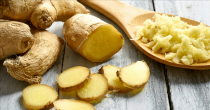
A popular spice used in cooking and a medicinal marvel, ginger has so many health benefits. We asked some experts to explain the different benefits of this spice.
From ginger shots claimed to boost your immunity to ginger-honey tea passed your way for every cough and cold, it feels like ginger is everywhere these days. But does it deserve all the hype? Exactly how effective is ginger in supporting our immunity and warding of illnesses? We asked dietician Olivia Morrison and Ross Austen, research and nutrition lead at MOJU to break down its benefits.
You may also like
The top 5 spices we should all be eating for better health, according to nutritionists
Why is ginger so good for us?
Ginger has been used for thousands of years in both ancient and modern medicine to treat digestive issues, flu-like symptoms and joint and muscle pain. Like turmeric, ginger has been shown to have fantastic anti-inflammatory and antioxidant benefits.
“Ginger contains traces of several beneficial micronutrients like iron, zinc, folate, vitamin C, magnesium and several B vitamins. However, health benefits aligned with ginger consumption are most often linked to one of its unique chemical compounds: gingerol,” Morrison tells Stylist.
You may also like
Period pains: can magnesium supplements ease menstrual cramps?
Top health benefits of ginger
It can help fight inflammation
Inflammation isn’t always a bad thing – it’s a natural process that helps to fight illness and injury in the body – but it becomes a problem when it lasts for weeks or longer. That’s when it can cause disease in the body.
The good news? Ginger might be able to help tackle it. Ginger contains high levels of antioxidants, and research shows it can support the body’s ability to combat inflammation and keep the immune system healthy, Austen explains.
A 2013 study even showed that ginger can reduce muscle pain after intense physical activity.
You may also like
Beat post-workout inflammation with this Moroccan roasted sweet potato and carrot salad recipe
It can help ease menstrual pain
A study published in The Journal of Alternative and Complementary Medicine showed that ginger was just effective as pain medications like ibuprofen in relieving pain in women with dysmenorrhea (period pain).
“Ginger can potentially help when it comes to managing menstrual pain as it helps to suppress the production of prostaglandins, a group of compounds that make the uterus contract, causing pain,” Austen says.

It can help treat indigestion
“Ginger has been shown to remedy, break down and get rid of gas more effectively, by stimulating digestive enzymes that help move food through the body,” Austen explains.
It can help soothe nausea
Ginger is regularly used as a natural treatment for stomach issues, such as bloating and indigestion, but studies have shoes that its compounds can also help reduce nausea and vomiting. “Gingerol is known for helping food move through the body as well as suppressing muscle spasms – making ginger the easy queasy go-to when you’re feeling a little green,” says Austen.
You may also like
Anxiety and nausea: here’s why it’s more common than you think
How much ginger should we eat?
It’s not about eating a specific amount of ginger each day or week so that you can reap its health benefits – it’s more about trying to include ginger in your usual meals and drinks on a regular basis.
“In saying that, please don’t run to your local health food store and start taking ginger supplements; they aren’t necessary or recommended to attain the above listed health benefits,” Morrison advises. “It’s best and safest to consume ginger naturally as an ‘extra bonus’ in your usual diet.”
There are so many easy ways to incorporate ginger in our diet: add it in smoothies, teas, curries, stir-fries, salad dressings and baked goods.

Is there anyone who should avoid having ginger?
“Rest assured ginger is very safe for the vast majority of people and only becomes concerning when taken without medical supervision in concentrated forms like capsules and extracts in high doses,” Morrison says.
“If you’re adding an unpalatable amount into teas, juices or curries each day, I’d recommend cutting back as overconsumption has been linked to causing digestive symptoms like diarrhoea, reflux and gas.”
If you feel something isn’t right or have noticed a possible side effect from increasing your ginger intake and are concerned, contact your GP.
If you can, opt for fresh ginger over ground ginger
Fresh is best as it contains more gingerol than ground ginger.
“When you’re cooking with fresh ginger at home; make sure the root is smooth without wrinkles or mould,” Morrison suggests. “Many of us keep our fresh ginger in the fruit bowl but it’s best to it keep refrigerated or frozen to reduce food waste and prevent it going off before use.”
You may also like
How to grow your own vegetables and herbs at home, without a garden
The great news is that fresh ginger is super easy to grow at home. “Simply soak a small amount of fresh ginger root with new bulbs in water for a day or so before popping it into a well-draining pot,” Morrison says. Make sure it gets enough sunlight and once the leaves that grow from the plant begin to die, it’s ready to harvest.
Images: Getty
Source: Read Full Article